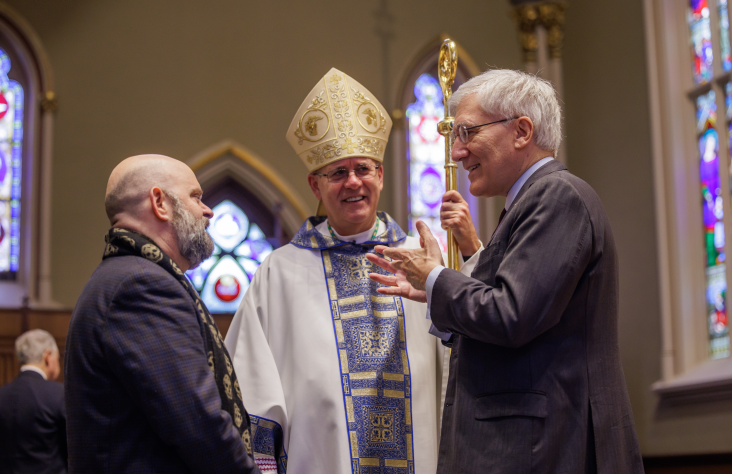November 30, 2019 // Diocese
Hearing God’s voice: Ignatian spiritual exercises
While the idea of a 30-day silent retreat may seem, in part, intriguing and appealing, four weeks away from family, work and responsibility can make the Spiritual Exercises of St. Ignatius of Loyola seem out of reach for many Catholics.
The exercises, prayers and meditations written by the 16th-century saint, who himself learned to pray while he recovered from life-threatening battle injuries, are a guide for any Christian seeking a deeper relationship with the Lord. The universal call to holiness is such that not only are men and women with religious vocations meant to pursue God through prayer methods such as the spiritual exercises, but rather, all of the faithful are given access to a profound relationship with God.

Peter Paul Rubens, commons.wikimedia.org
Diocesan seminarian Jacob Schneider’s recent experience with the Ignatian spiritual exercises has impacted his life and faith. Now in his third year of seminary studies, Schneider grew up in a Catholic family in Fort Wayne and had the faith instilled in him at a young age. As is the case for many young people, however, his practice of the faith at one point became one of going through the motions habitual, and he restricted God to a limited role in his life.
His formation and studies as he now discerns a vocation in the priesthood strengthened his relationship with the Lord, he said, and entering into St. Ignatius’s spiritual exercises last summer transformed it.
“My current spirituality has grown since entering seminary, but even to a greater degree over this past summer. Ignatian spirituality brought me to a deeper relationship with God because it recognizes that at all times our relationship with God is manifested in different ways. Just as our bodies are constantly changing externally and internally, so too our spiritual souls are constantly receiving and giving,” he said. “Ignatian spirituality focuses on the discernment of spirits, and this discernment heightens our awareness of our spirituality.
“Our souls are constantly informed by one or many of these ‘voices’: ourselves, God, our environment, the devil and the world,” he continued. “We must discern which promptings to listen to and act upon. Every person has the great responsibility to choose God’s voice and act solely upon it. This responsibility requires freedom to do what the Lord asks.”
Schneider encourages others to seek out opportunities to enter into Ignatian spirituality.
The Christian seeking to do God’s will must first be able to identify the Lord’s voice in the quiet of their heart, he noted.
“Most of us will never receive an audible response from the Lord, so it is through our thoughts, feelings and desires that the Lord is able to communicate His will for us. Ignatian spirituality equips people to recognize and be aware of the different thoughts, feelings, and desires: Through his spiritual exercises, Ignatius enlightens our minds to notice these through lingering temptations, our own thoughts, the influence of our culture and friendships, and most importantly the voice of God the Father,” he said.
“It is the voice of the Father, who calls out to His beloved sons and daughters, leading them to safety and happiness. Driven by the desire to do the Father’s will, Ignatian spirituality teaches how to discern those thoughts, feelings, and desires and how to act upon them – to either reject or accept them.”
Schneider’s experience brought to light the ways God speaks to him in the call to prayer, helping reveal to him his true identity as a son of a loving God.
“I became aware that our relationship with God is affected by everything we do. The time we devote to prayer and developing our relationship with the Trinity, Mary and the saints is influenced by all our actions.”
“The most important thing is to spend time with Him, “ Schneider continued. “We see this in human relationships as well: There are times when people spend time together and don’t exchange words, but the mere presence of another is comforting and is a loving gesture by which they receive and give love. We respond during these relationships, so we must receive from Jesus and react to our relationship with Him.
“The Lord communicates himself most frequently to us in silence,” he reiterated. “Our identity as Christians is our relationship with God, as adopted beloved sons and daughters of the Father through Jesus Christ by the Holy Spirit. Many people define themselves by their own thoughts and actions, but this can be inconsistent with our reality. Thoughts and actions fluctuate so frequently that they don’t establish a permanent identity. The Father bestows an everlasting dignity as sons and daughters through our baptism, though, and our duty is to act so as to be deserving of this relationship.
“By discerning His voice, we can conform our actions to His call. Being conformed to His will is the response and acceptance of His love. His love leads us to happiness, which is fulfilled partly in this life and completely in heaven.”
Ignatian spirituality is not only for priests and seminarians, but is accessible to lay people through retreats and events hosted throughout the diocese, as well as in small prayer groups.
Schneider’s advice for those who want to pursue the exercises? “Those who are interested must be ready to be flexible and molded by what Ignatius prescribes. Not every person fits the mold of purely Ignatian spirituality, but learn and use what benefits your relationship with the Lord. You can only benefit by entering into Ignatian spirituality because either you might benefit by entering into a deeper relationship with the Lord, or someone else may benefit through your experience that you share with them.”
For more information on the spiritual exercises of St. Ignatius of Loyola, go to www.priestlyformation.org. There is a ‘Laity’ tab that links to many easy-to-use resources.
The best news. Delivered to your inbox.
Subscribe to our mailing list today.






